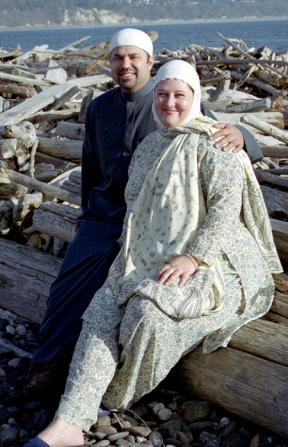Most islanders don’t feel the need to alert local law enforcement and the state ferry system when friends are coming for a visit, but Leah Jaswal thought it was prudent.
Many of the guests of Farooq and Leah Jaswal were coming from the Seattle area, and she feared a group of 30 to 40 Sunni Muslims dressed in traditional Middle Eastern garb boarding the ferry to Whidbey Island might cause a stir on the normally uneventful crossing.
Thanks to the warning, perhaps, the crossing was uneventful. Leah Jaswal greeted every new arrival with a hug and, “Asalaam alicum.” They replied, “Walicum salaam.” Translation of both: “Peace be with you.”
Soon, it turned into a typical Whidbey Island gathering of friends and family. On a rare, windless sunny Sunday on Keystone beach uncles and brothers sat in groups on the driftwood, discussing work, family and world politics. A few kneeled on a cloth-covered concrete deck, facing east. Two young city boys industriously gathered beach rocks while their patient father held a potato chip bag turned treasure chest.
A jumble of shoes, from red leather sandals to L.L. Bean moccasins lay outside the door of the Jaswals’ beach house. Inside, aunts and sisters sipped chai or orange soda, while they prepared food, looked at a photo album from a recent trip they all took, or just admired the panoramic view over Admiralty Inlet.
The gathering at the Jaswals’ home was a reunion of a group of Muslims who went on “Hajj,” or pilgrimage to Mecca in February. The group was led on the trip by their Imam, Mohammed Joban. The name might not be familiar, but Joban achieved national attention last month when two Washington state representatives walked out on his Islamic opening prayer in the state House of Representatives.
Then, he forgave them and said their actions were based on ignorance of Islam. Now, he laughs that instead of getting maybe six minutes in the spotlight during his prayer, he was able to praise Allah and Islam before a much larger audience.
At a time when Muslims are being “profiled” in the name of Homeland Security, and mosques are sometimes the targets of hate crimes, this group wanted people to know one thing:
“We are just like you,” Farooq Jaswal said. “We want the same things as you. We want to live in peace.”
While the Muslims assembled for this potluck reunion called each other familial names, aunt, uncle, brother, sister, Jaswal said that moniker extends to all mankind.
“We are all brothers and sisters,” he said, making a sweeping gesture along the Keystone shoreline.
The Jaswals are one of the few, perhaps the only, Sunni Muslims living on Whidbey Island. They live part time at their Keystone beach house, and hope to sell or rent their house in Bellevue to live here full time. They have been active in the community, and many in Coupeville will remember seeing their red 1969 convertible Cadillac in the 2001 Memorial Day Parade with the mayor and base commander. A few of Farooq Jaswal’s other “toys” have also been in the parade, including his 1927 Bugatti 35-D and a Delorean — the gull-winged car made famous in the “Back to the Future” movies.
Leah Jaswal calls herself an “average white girl” who happened to fall in love with and marry a Muslim man from Pakistan when they were both 18. She decided about 15 years ago, after several years of marriage, to convert to Islam.
Imam Joban noted that although Islam is one of the fastest growing religion in the United States, Islam does not “recruit” followers.
“We don’t force Islam on others,” he said. “There are no Muslim missionaries.” Instead, Joban gave examples of people who wanted to learn about Islam, and ended up embracing it. He also told of a man who wanted to bomb a mosque, but was invited inside, and was so moved by the warm welcome that he converted.
“So, give a respite to the disbelievers,” Joban told those gathered at the Jaswals. “Deal gently with them for awhile.”
According to the U.S. Department of State, America’s Muslim population is expected to surpass the Jewish population by the year 2010, making it the second-largest faith after Christianity.
The state department says while there are no official population figures for religious affiliations in the United States, estimates of the Muslim population range from four million to eight million. There are nearly 2,000 mosques nationwide.
The Islamic cleric said Muslims and Christians worship the same God, and that the Islamic holy book, the Quran, in an extension of the Bible.
“They are the same teachings,” Joban said. “Mohammed (the Islamic prophet and founder of Islam) was sent for all mankind.”
Fozia Tahir, from Pakistan, wanted to dispel some of the misinformation about women and Islam.
She said the Quran treats women and men as equals, and doesn’t force women to wear veils, hijabs (head scarves) or burkas, the full body-covering robes. Instead, clothing preference is cultural, or the choice of the couple.
“Islam doesn’t force you to wear a veil,” she said.
She explained the purpose of covering the female body is to protect women from prying eyes and unwanted advances.
“A woman is like a pearl,” she said. “Her treasures are precious and hidden.”
She said in some instances a woman may choose to not wear a veil because it draws too much attention, the opposite of its intended purpose.
While the group may have attracted attention on Whidbey Island, the Jaswals say they have not had any negative experiences.
“Most people are just curious,” Farooq Jaswal said. “When they get to know us, they see we are not so different.”
You can reach News-Times reporter Marcie Miller at mmiller@whidbeynewstimes.com or call 675-6611


